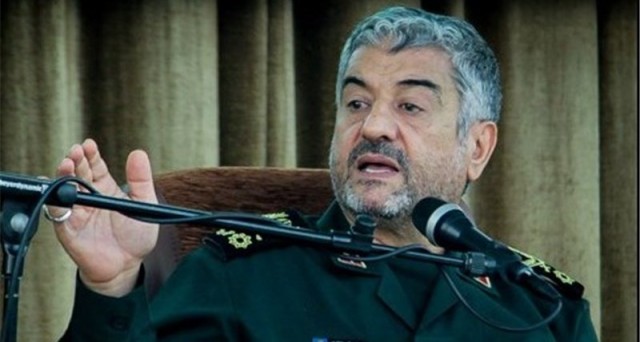PHOTO: Head of Revolutionary Guards, General Mohammad Ali Jafari
LATEST
A day after issuing a warning to the Rouhani Government, the head of the Revolutionary Guards has turned to Saudi Arabia, accusing it of trying to overthrow the Islamic Republic.
Addressing naval commanders on Thursday, General Mohammad Ali Jafari said the Saudis have become “clear enemies and today spend a lot of money to spread instability to Iran”.
He assured, “The high readiness of the military has defeated all the plots of the enemy in the country.”
Relations between Tehran and Riyadh have long been tense over issues in the Middle East, but the situation has worsened since last September. Iran accused the Saudi leadership of negligence or even deliberate killing after 464 Iranian pilgrims were among thousands who died in a crush at a religious ceremony near Mecca.
In January, a crowd in Tehran attacked and burned the Saudi embassy after Riyadh executed a prominent Shia cleric. Days later, the Saudis cut diplomatic relations.
The Rouhani Government, whose foreign policy of engagement has been damaged by the events, has tried to limit the fallout. However, the Supreme Leader, Revolutionary Guards, and other officials have maintained their denunciation of the Saudis, linking the criticism to crises such as the Syrian civil war, Saudi aerial intervention in Yemen’s conflict, and Riyadh’s support of the repressive Bahraini monarchy.
However, Jafari’s comments appear to be linked to the recent emphasis by Iranian authorities on the threat of “terrorism” and “sedition” inside Iran.
For weeks, officials — including the Supreme Leader — have returned to the warnings, prominent in the suppression of protests after the disputed 2009 Presidential election, that foreign-supported groups are carrying out terrorism and seeking regime change.
The Secretary of the Expediency Council, Mohsen Rezaei, linked the campaign to Saudi Arabia when he said Riyadh has established a training camp in Iraqi Kurdistan near the Iranian border. Rezaei claimed that Iranian Kurdish insurgents, who have been in a series of clashes with Iranian security forces this summeer, were preparing operations there.
Saudi officials have also stoked the tension this month. Prince Turki, the former head of Saudi intelligence, spoke at a Paris rally for the Iranian group Mujahedeen-e-Khalq. Tehran considers MEK a terrorist group — as, for a long time, did Washington and European powers — because of attacks that killed thousands of Iranians since 1980.
Iran’s Prayer Leaders Press Turkey to Drop Syrian Opposition and Rebels
Having supported President Recep Tayyip Erdoğan against the coup that tried to overthrow him, the Iranian regime is pressuring Turkey to distance itself from Syria’s opposition and rebels.
Leading Friday prayers in Tehran, Ayatollah Ahmad Khatami condemned the coup attempt but continued:
Opposing the coup does not mean that we do not have any criticism of the Turkish President.
A little while ago, the Turkish president apologized to Russia for the downing of the Russian warplane [near the Turkish-Syrian border in late November], but the Turkish president owes two other apologies.
Khatami said Erdoğan “must apologize” for “supporting the Islamic State” in Syria and for trying to improve relations with Israel as well as Moscow.
The Qom Friday Prayer Leader, Ayatollah Hashem Hosseini Bushehri, said the defeated coup was a “golden opportunity” for the Turkish Government to “reconcile with its neighbors and cease all of its policies aimed at destroying the military and economic foundations of Syria”.
And in Hamedan, Friday Prayer Leader Ayatollah Ghiaseddin Taha Mohammadi warned, “With the excuse of reviving the Ottoman Empire, [Erdoğan] has displaced many Syrians and Iraqis in dealing with the Islamic State.” (ISNA)

